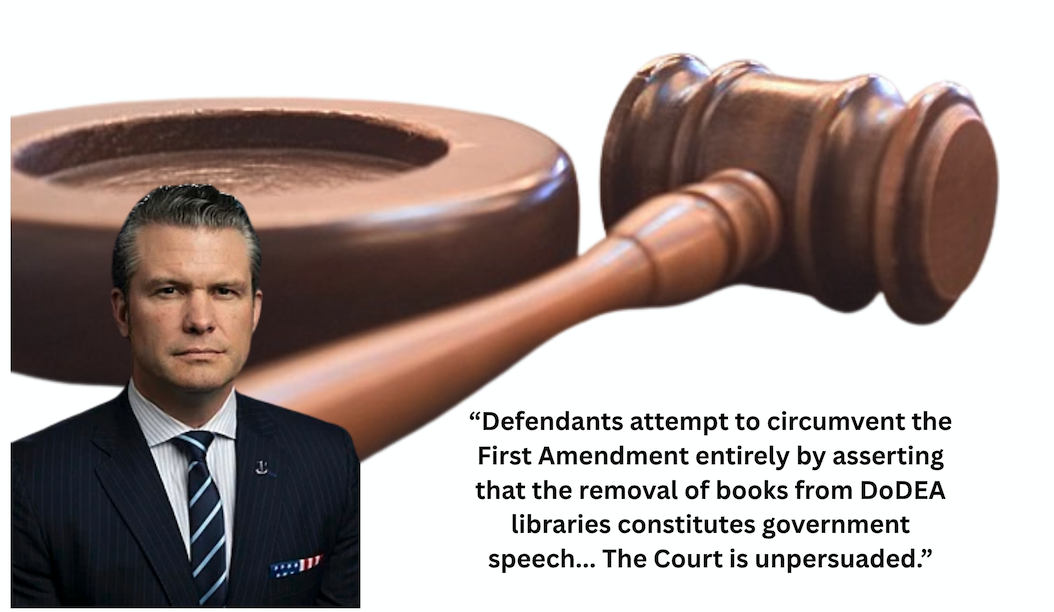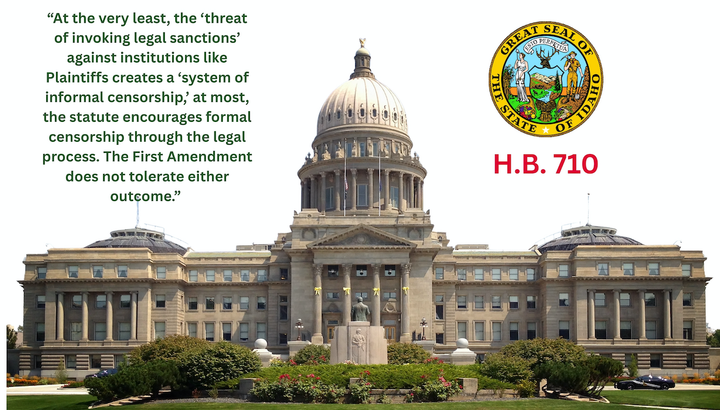Judge Rejects 'Government Speech' Argument in DoD Book Banning Case
Despite the government's arguments to the contrary, DoDEA school libraries “lack the quintessential elements of government speech,” judge Patricia Giles held, explaining that public school libraries “have historically been loci of intellectual freedom.”

In a significant win for the freedom to read, a federal judge this week ordered the Department of Defense to return dozens of banned books dealing with race and gender to school libraries on five military bases, finding that their removals had nothing to do with pedagogy but were based on orthodoxy, and thus violated the plaintiff students’ First Amendment rights.
In her October 20 opinion and order, Judge Patricia Giles in the Eastern District Court of Virginia, a Biden appointee, granted a preliminary injunction ordering the books to be returned and barring further book removals at five schools located at military bases in Quantico, Virginia; Aviano, Italy; Fort Campbell, Kentucky; and Japan.
"The record is clear that by removing books, Defendants intended to deny Plaintiffs access to ideas that they, by virtue of the Presidential EOs, found distasteful, radical or divisive," Giles concluded. "Plaintiffs have demonstrated a likelihood of proving that Defendants were impermissibly motivated by a partisan interest when removing DoDEA library books."
The bans came in the wake of President Trump’s executive orders prohibiting DEI at federal agencies, and a January memo by Secretary of Defense Pete Hegseth, "Restoring America's Fighting Force," which prohibited the teaching of Critical Race Theory, DEI, and gender ideology.
Importantly, Giles eviscerated the defendants’ government speech defense.
“Defendants attempt to circumvent the First Amendment entirely by asserting that the removal of books from DoDEA libraries constitutes government speech,” Giles wrote. “On Defendants’ theory, ‘the inclusion, or exclusion, of certain materials reflects DoDEA’s expressive act of speech that it wishes to convey to its audience—here, schoolchildren.’ Therefore, Defendants contend that as DoDEA’s speech, library curation is exempt from the First Amendment. The Court is unpersuaded.”
Despite Defendants’ arguments to the contrary, DoDEA school libraries “lack the quintessential elements of government speech,” she continued, explaining that Public school libraries “have historically been loci of intellectual freedom.”
“Viewing public school libraries as places of academic freedom and intellectual pursuit conflicts with the United States’ notion that school libraries represent government speech,” Giles added. “It is furthermore doubtful that the public—or DoDEA students, for that matter—perceives the books in school libraries as conveying a government message.”
That finding could be meaningful, as the government speech theory has animated several book banning laws and policies across the country—and as the Supreme Court considers whether to weigh in on the issue in a potentially landmark book banning case, Little v. Llano County, in which a plurality of the Fifth Circuit Court of appeals held that library book decisions are government speech.

In a statement, PEN America officials praised the decision.
“The scale of book removals across schools for military families in response to edicts from the White House is a further escalation of the book banning crisis and comes on the heels of four years of coordinated efforts to suppress and restrict reading material for public school students nationwide,” said PEN America’s Freedom to Read Program Director Kasey Meehan. “This ruling is a solid first step in a long road to restoring and protecting students’ freedom to read in schools run for military families, and we hope this decision will serve as useful precedent in other courts.”



